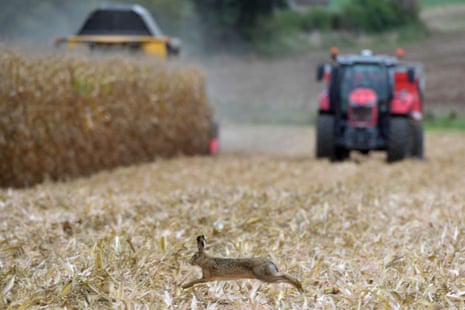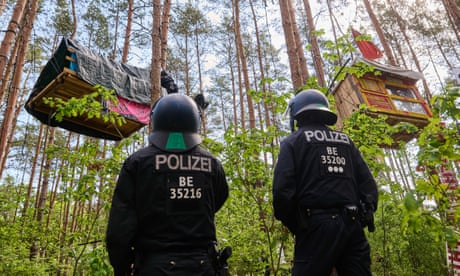 Some MEPs claim that a move to more nature-friendly agriculture would negatively impact farmers.
Some MEPs claim that a move to more nature-friendly agriculture would negatively impact farmers. Sandrine Dixson-Declève, Janez Potočnik and Paul Polman
THE GUARDIAN
Wed 31 May 2023
For 10,000 years, human civilisation has grown and thrived because of Earth’s remarkable regenerative capacity that sustains climate stability and rich biological diversity. Now human activity has severely undermined this resilience.
Our patterns of economic growth, development, production and consumption are pushing the planet’s life-support systems beyond their natural boundaries. Last week, members of the European parliament’s agriculture and fisheries committees voted to continue this destruction, rejecting European Commission proposals for a nature restoration law. The vote flies in the face of science, and the claims by some MEPs to be defending farmers and food security are flawed.
Since the Russian invasion of Ukraine, soaring inflation has pushed up food prices. European citizens are worried. Sixty-four per cent of people in 12 European countries, including the UK, say the cost of food is their biggest worry, ahead of concerns about the cost of housing and heating.
Changing farming practices to align food production with efforts to manage the climate crisis and restore nature is the only solution to ensure affordable food for all. Yet certain MEPs are using the war in Ukraine as an excuse to defend post-second world war industrial farming methods and to attack commission plans to make farming more nature-friendly.
These MEPs, mainly from the centre-right European People’s Party (EPP), claim that a move to more nature-friendly agriculture would negatively impact farmers and even jeopardise EU climate commitments by making it more difficult to build wind and solar farms. Research by the European Commission shows, however, that the climate crisis and biodiversity loss are “already jeopardising food production” in Europe and that the situation will only get worse.
Hand in hand with another commission proposal to cut the use of pesticides, the nature restoration law would require changes to current farming methods to reduce harm to wildlife, increase water harvesting, prevent soil erosion, enhance pollination and encourage a more diverse production of crops. Even the private sector refers to the law as a key tool and opportunity to take concrete and effective action.
The argument that today’s system of industrial agriculture, fed by fossil fuels and pesticides, will increase food security, secure climate action and offer long-term protection for rural communities is found wanting. At least 10% of Europe’s greenhouse gas emissions come from agriculture, with the food sector as a whole responsible for as much as a third of EU emissions. On top of this, degraded soils from overproduction and poor management as well as reducing agricultural yields make the climate emergency worse: rather than absorbing carbon dioxide from the atmosphere, they release it.
Politicians railing against restoring nature are defending a broken system that must be overhauled for the sake of all
“We can do excellent work in decreasing emissions,” the EU environment commissioner, Virginijus Sinkevičius, told the Guardian recently. “But if ecosystems degrade, if soil degrades, if forests and marine ecosystems degrade, they are not able to absorb carbon or mitigate heat.” Sinkevičius rightly argues that the nature restoration law would “give nature a chance to be the vital force we need for our future and our economies”.
Many in the private sector and the farming community are already working together to implement changes in line with the proposed law that reduce risk and increasingly make good economic sense.
Defending the status quo, as the parliament’s agriculture committee opted to do, will not help farmers. They will be left to cope with unproductive land and the vagaries of climate change-induced extreme weather, affecting their lives and livelihoods.
Farmers in Europe are already suffering from droughts and floods. Spain is turning into an unproductive desert – the Spanish government set aside €2.2bn (£1.9bn) this month to help farmers deal with the country’s ongoing drought. In Emilia-Romagna, one of Italy’s most important agricultural regions, six months’ worth of rain fell within 36 hours in the middle of May. The floods followed a severe drought. Water is poorly absorbed by dry land, and more than 300 landslides were the result.
“Everybody is entitled to have their own opinion, but opinions are not facts,” Frans Timmermans, the commission’s executive vice-president, said when defending the nature restoration law in the European parliament. “Let’s at least agree on the facts.”

MEPs accused of ‘culture war against nature’ by opposing restoration law
The facts are that climate action, nature restoration and food production go hand in hand. Politicians arguing against restoring nature are not fighting to protect consumers from high prices. They are not fighting to protect farmers. They are not fighting to defend climate action. Politicians railing against restoring nature are fighting to defend a broken system that must be overhauled for the sake of us all, farmers included.
It is now up to members of the parliament’s environment committee, and then the parliament as a whole, to show they understand just what is at stake.
Sandrine Dixson-Declève is the co-president of the Club of Rome, Janez Potochnik is the co-chair of the International Resource Panel and a former European commissioner, and Paul Polman is the co-founder and chair emeritus of Imagine and a former CEO of Unilever
Wed 31 May 2023
For 10,000 years, human civilisation has grown and thrived because of Earth’s remarkable regenerative capacity that sustains climate stability and rich biological diversity. Now human activity has severely undermined this resilience.
Our patterns of economic growth, development, production and consumption are pushing the planet’s life-support systems beyond their natural boundaries. Last week, members of the European parliament’s agriculture and fisheries committees voted to continue this destruction, rejecting European Commission proposals for a nature restoration law. The vote flies in the face of science, and the claims by some MEPs to be defending farmers and food security are flawed.
Since the Russian invasion of Ukraine, soaring inflation has pushed up food prices. European citizens are worried. Sixty-four per cent of people in 12 European countries, including the UK, say the cost of food is their biggest worry, ahead of concerns about the cost of housing and heating.
Changing farming practices to align food production with efforts to manage the climate crisis and restore nature is the only solution to ensure affordable food for all. Yet certain MEPs are using the war in Ukraine as an excuse to defend post-second world war industrial farming methods and to attack commission plans to make farming more nature-friendly.
These MEPs, mainly from the centre-right European People’s Party (EPP), claim that a move to more nature-friendly agriculture would negatively impact farmers and even jeopardise EU climate commitments by making it more difficult to build wind and solar farms. Research by the European Commission shows, however, that the climate crisis and biodiversity loss are “already jeopardising food production” in Europe and that the situation will only get worse.
Hand in hand with another commission proposal to cut the use of pesticides, the nature restoration law would require changes to current farming methods to reduce harm to wildlife, increase water harvesting, prevent soil erosion, enhance pollination and encourage a more diverse production of crops. Even the private sector refers to the law as a key tool and opportunity to take concrete and effective action.
The argument that today’s system of industrial agriculture, fed by fossil fuels and pesticides, will increase food security, secure climate action and offer long-term protection for rural communities is found wanting. At least 10% of Europe’s greenhouse gas emissions come from agriculture, with the food sector as a whole responsible for as much as a third of EU emissions. On top of this, degraded soils from overproduction and poor management as well as reducing agricultural yields make the climate emergency worse: rather than absorbing carbon dioxide from the atmosphere, they release it.
Politicians railing against restoring nature are defending a broken system that must be overhauled for the sake of all
“We can do excellent work in decreasing emissions,” the EU environment commissioner, Virginijus Sinkevičius, told the Guardian recently. “But if ecosystems degrade, if soil degrades, if forests and marine ecosystems degrade, they are not able to absorb carbon or mitigate heat.” Sinkevičius rightly argues that the nature restoration law would “give nature a chance to be the vital force we need for our future and our economies”.
Many in the private sector and the farming community are already working together to implement changes in line with the proposed law that reduce risk and increasingly make good economic sense.
Defending the status quo, as the parliament’s agriculture committee opted to do, will not help farmers. They will be left to cope with unproductive land and the vagaries of climate change-induced extreme weather, affecting their lives and livelihoods.
Farmers in Europe are already suffering from droughts and floods. Spain is turning into an unproductive desert – the Spanish government set aside €2.2bn (£1.9bn) this month to help farmers deal with the country’s ongoing drought. In Emilia-Romagna, one of Italy’s most important agricultural regions, six months’ worth of rain fell within 36 hours in the middle of May. The floods followed a severe drought. Water is poorly absorbed by dry land, and more than 300 landslides were the result.
“Everybody is entitled to have their own opinion, but opinions are not facts,” Frans Timmermans, the commission’s executive vice-president, said when defending the nature restoration law in the European parliament. “Let’s at least agree on the facts.”

MEPs accused of ‘culture war against nature’ by opposing restoration law
The facts are that climate action, nature restoration and food production go hand in hand. Politicians arguing against restoring nature are not fighting to protect consumers from high prices. They are not fighting to protect farmers. They are not fighting to defend climate action. Politicians railing against restoring nature are fighting to defend a broken system that must be overhauled for the sake of us all, farmers included.
It is now up to members of the parliament’s environment committee, and then the parliament as a whole, to show they understand just what is at stake.
Sandrine Dixson-Declève is the co-president of the Club of Rome, Janez Potochnik is the co-chair of the International Resource Panel and a former European commissioner, and Paul Polman is the co-founder and chair emeritus of Imagine and a former CEO of Unilever
No comments:
Post a Comment